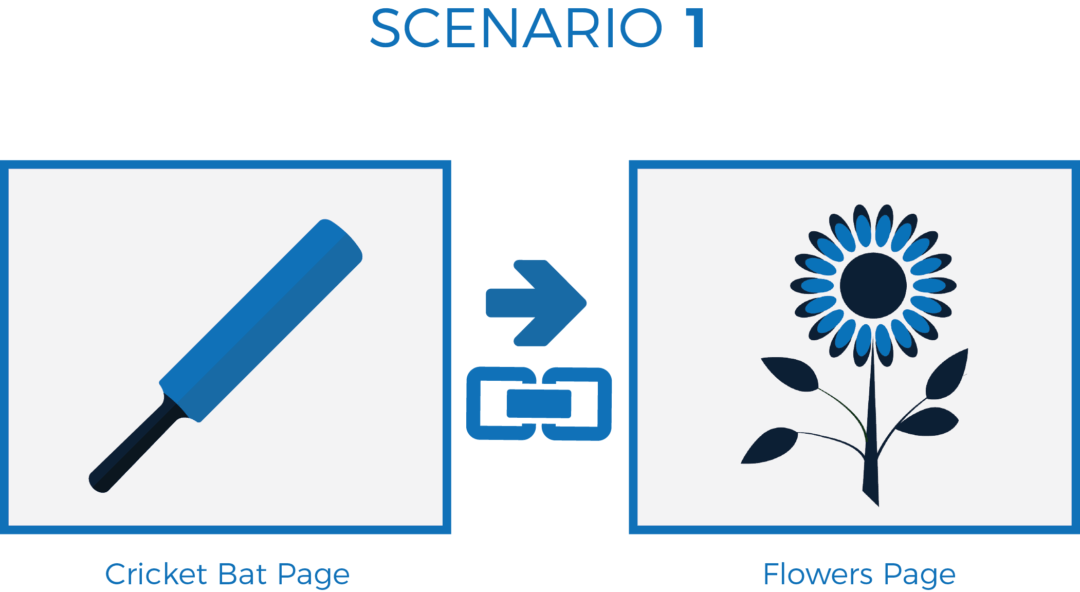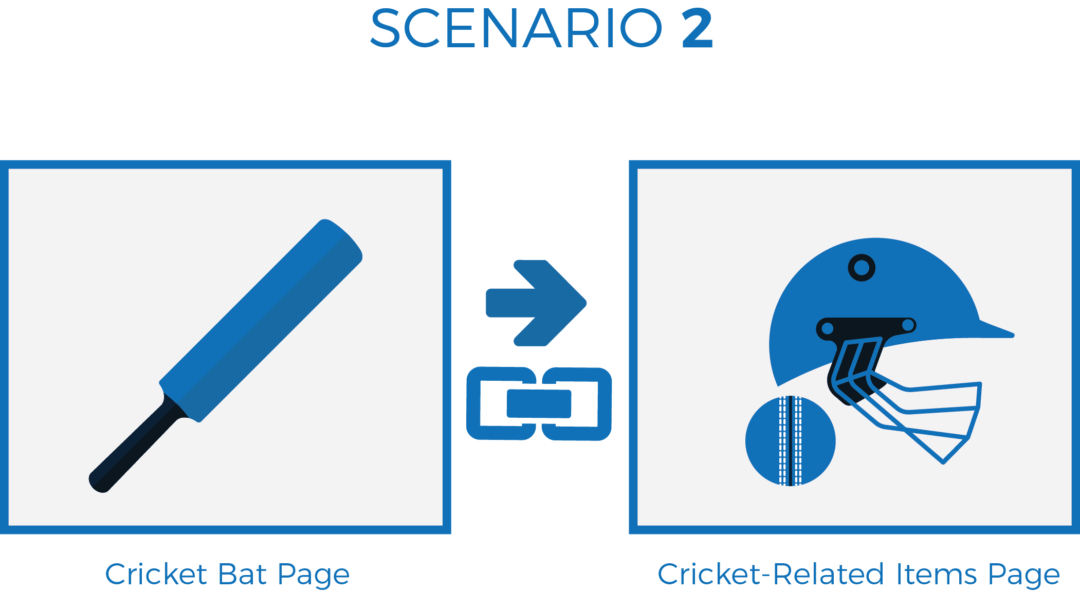What is link juice and how to get more of it: Part 2
Link equity is relative
Link equity highly depends upon the context in which the backlink is given. This means that the topic of a website’s page that is linking to your content must be related to what your page is about. Consider these two linking scenarios:
Linking scenario 1

In scenario 1, the page about cricket is linking to a website about flowers. This doesn’t make any sense because there are no flowers on a normal cricket field, and it is, for our purposes, a link that will not pass significant equity.
Link scenario 2

In scenario 2, the same cricket article is linked to a piece on the evolution of cricket positioning and helmets. This link adds value and is helping the user better understand the content. This link is awarded some link equity.
Resources are another great example of relative links. Users need resource pages to learn more about a given topic. SEOs also love a natural link on a resource page. However, if the link is not helpful, chances are it won’t pass a significant amount of that precious holy link water.
Link juice from authoritative websites
When it comes to the website linking to your content, there are two important factors: Website authority and industry relevance. Essentially, websites in good standing that are trustworthy pass link juice if the link is relevant to the content on the page. There are several tools that “calculate” authority.
These include Moz DA, Ahrefs Domain Rating, and Majestic Trustflow. These scores are generally calculated to help decide which pages are in good standing and which are not. For example, if the New York Times links to your website, you can bet some fancy link juice will come your way.
Authoritative link equity comes from sites with high authority.
One often overlooked fact is that non-authoritative websites relative to a specific industry can still pass authoritative link juice.
These sites are often authoritative for their specific industry but not in the traditional sense outlined by the “authority” tools mentioned above.
While these sites may have a low DA, they often can pass more link juice than high authority, non-relative sites. For example, a piece on the best above-ground pool maintenance that gets backlinks from several small pool companies will earn a lot of link juice, even if the pool websites are not that authoritative.
The Anchor text of a link matters (a lot)
Anchor text helps Googlebot and other search engines understand what the destination page is about. However, many rules and regulations on anchor text have come from Google and other studies. These are a result of SEOs attempting to manipulate the search algorithms. This is an example of why engaging in best practices is important. As SEOs find ways to try and trick the algorithm, Google will continue rolling out updates to prevent these tactics from increasing SERP rankings. Bad or dangerous anchor text has these characteristics:
- Stuffed with keywords.
- Extremely long.
- Not relevant to the end destination.
Check out this resource on finding the best cricket bats. If you clicked the link, you would see it takes you to a Wikihow article on keeping spiders as pets. Not cool and very misleading. This link will not pass link juice, nor is it a good link for Wikihow.
What is a good anchor text for a backlink?
Good anchor text for a backlink has the following characteristics: Natural, relative, short, and adds value to the user.
If you find a backlink to your site with a potentially misleading anchor text, contact the webmaster and ask to change it. If they are unwilling to make the change, there is no concern as Google and other search engines will likely ignore it.
How to spread link juice around your website
The next question people often ask is, “How do you spread link juice around your site?” There are several ways to do this. Once you have a page with a high page rank, you can spread the link juice by internally linking to other pages that you want to grow in value.
There are numerous internal linking tactics, but the most common are: internal links on the page, in the body of the text, internal links in the sidebar, internal links in the navigation, or internal links as a source or a “view next.”
Link equity manipulation
Over the years, there has been a lot of talk about “link equity manipulation.” The term “manipulation” has negative undertones, so many people tend to see it as bad. Manipulating your link equity is not always a bad thing.
If leveraged properly, it can be used to benefit both your SEO and your user experience. First, let’s define Link Equity Manipulation: The process of leveraging link equity to help improve the ranking signals to other parts of your website. There are two types of link equity manipulation: good and bad.
Bad link equity manipulation
Nefarious external linking: This is the process of linking out to other sites in an unnatural way to improve your authority or site relevance. This can be done in several ways:
- Dofollow links to affiliate products.
- Dofollow links to products or services that you get paid to promote.
- Unnatural links to other sites.
There have been many studies that show the benefit from external links. However, if you link to a site too many times, it becomes unnatural. A great example of this is site-wide links. Search Engine Watch has a great article on site-wide links here.
In general, site-wide links look extremely unnatural and should be removed. However, if the link is natural and you do not have a history of purchasing blogroll links or other spammy site-wide links, there is nothing to worry about. In our opinion, site-wide links are something people do when they get paid or have a sponsor, and these should be nofollowed.
Are internal links good for SEO?
Internal linking is extremely important to help users navigate your site better and show the robots how pages are connected. Link equity can be spread throughout pages through internal linking. However, this practice can hurt your site if not completed properly. For purposes of this article, the “bad” internal linking practices are stuffing anchor text in internal links, too much of the same anchor text on a specific page, and too many internal links (outside of navigation, shoot for 2-3 per page).
Good link equity manipulation
Good link equity manipulation is essentially the practice of connecting your site to make it easy for the bots and users to understand. When you notice that your site has many solid links coming to a page, you can safely leverage that page to improve other pages on your site. This is the concept of spreading the link juice around your site. You can accomplish this in a few ways:
- Find pages with a lot of link juice and add internal links to other important SEO pages (in natural ways).
- Create an internal link map that groups your pages logically.
What about 301 redirects?
The 301 redirect is a tool that many SEO professionals enjoy leveraging to manipulate link equity. This is the practice of taking pages with a lot of link juice and 301ing them to a page that needs a bit more “oomph” to rank well. Some will even redirect entire domains to earn more link equity. Like everything in SEO, there are good and bad ways to implement 301s. It is important to note that Google has announced that 301 redirects pass along most of the original authority. This means that SEOs should not have to worry about link equity getting lost in a 301 redirect, right? Not quite.
Google knows the difference between a 301 that is helpful and one that is trying to manipulate link equity and will treat irrelevant 301s as soft 404s and essentially kill any link juice. GSQI has completed studies that indicate this to be a fact. A good SEO audit can help determine if your site needs additional 301 support.
How can I properly leverage 301s?
Ensure that your 301s are relevant and pointing to a specific and relevant page. Anchor text matters here as well. If the old destination page is one about cricket bats, do not redirect to a page about flowers, redirect to one about cricket bats. If you acquire another domain, redirecting everything to your homepage is helpful, but you will likely lose a lot of link juice. Instead, complete a 301 project to ensure all URLs are redirected to the proper page.
404 pages & link juice
Find 404 pages with backlinks for instant link equity and write 301s to a similar page.
Boom! Instant link equity. If you do not have a similar page, create one, write the 301, and pass the link equity to another page via an internal link. The bottom line is that link equity manipulation can be helpful if done in a way that is good for the user and is not “unnatural.” If you can’t create a new page to 301 the 404 page to, retain the link equity via outreach.
This can apply to soft 404s as well like sold-out product pages. Simply identify the 3rd party site linking to your 404 page and ask if they can update the page to a working URL. This approach assumes the replacement page you are pitching makes some sense contextually.
Ready to supercharge your SEO strategy and rank better on the SERP? Reach out to DEPT® to connect with our team of skilled SEO professionals.
Learn more about our SEO services
Explore
Questions?




